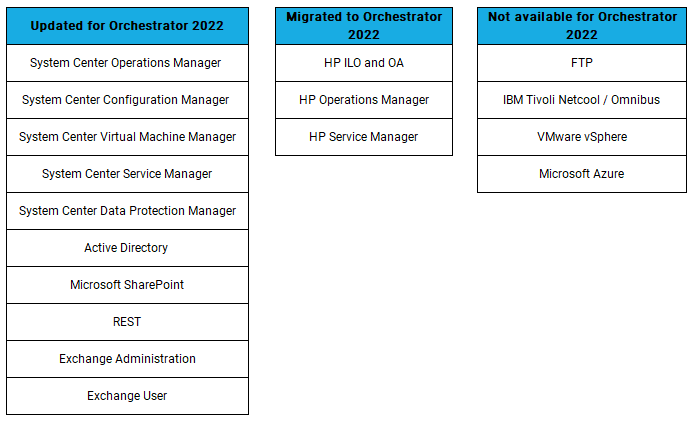Following the announcement of System Center 2025, it’s clear the suite isn’t going anywhere, and many organizations are considering moving to a newer version to capitalize on the 64-bit update to the application in the 2022 release of Orchestrator.
For organizations looking to upgrade from earlier versions of Orchestrator such as 2016 or 2019 to System Center Orchestrator 2022, there are several things to be aware of before migration, as Orchestrator 2022 has a major change to the application.
Orchestrator 2019 and all its predecessors are 32-bit applications. Orchestrator 2022 is the first version of Orchestrator, which is a native 64-bit application. This enhancement has made Orchestrator compatible with the modern 64-bit Windows Server and Powershell versions.
Whilst this is great news from a supportability and product longevity viewpoint, it does cause challenges for customers looking to migrate from older versions to Orchestrator 2022, and these should all be considered when planning an upgrade.
Integration Pack Compatibility
Integration Packs written for Orchestrator 2019 and earlier ARE NOT compatible with Orchestrator 2022 because they are all 32-bit applications. As such, these will not work with the 64-bit Orchestrator 2022.
Kelverion has produced 64-bit versions of our Integration Packs, which allow Orchestrator 2019 runbooks (using our Integration Packs) to be converted directly into Orchestrator 2022 runbooks. However, many organizations have used Integration Packs from other sources, which will need to be checked for Orchestrator 2022 compatibility.
CodePlex Integration Packs
Integration Pack compatibility is particularly relevant to anyone using CodePlex Integration Packs in Orchestrator today. CodePlex was a forge website by Microsoft. While it was active, it allowed a shared development of open-source software. On the initial release of Orchestrator, some individuals released free open-source Integration Packs that users downloaded and used in their runbooks.
CodePlex was discontinued in 2017, and these Integration Packs are no longer available nor are they being developed or enhanced. All these Integration Packs are 32-bit and, therefore, will not work in Orchestrator 2022.
Anyone using CodePlex Integration Packs will need to find alternatives to replace these activities in their runbooks. Over the years, Kelverion has developed Integration Packs, which offer capabilities similar to those of many of the common CodePlex Integration Packs. This is due to the demand from organizations requiring officially supported versions of Integration Packs to use in their runbooks.
Unfortunately, there are CodePlex Integration Packs for which no viable alternative exists, and the runbooks will need to be completely rewritten to use some other mechanism. If some assistance is needed, Kelverion offers consulting through our Professional Services Team to address challenges like this, in addition to bespoke creation of integrations with our in-house development team.
Microsoft Integration Packs
Microsoft has a suite of Integration Packs developed since releasing Orchestrator 2012. Some of these Integration Packs had major updates when they were released for Orchestrator 2022; a few have just been converted to Orchestrator 2022, and others were dropped altogether.

Up to date at July 2024
PowerShell Scripts
Historically, running PowerShell scripts in Orchestrator had always been challenging because Orchestrator was 32-bit, and most PowerShell is 64-bit. It was challenging to trigger most PowerShell cmdlets from within a script running in the .Net Script Activity as these were in a different memory space than Orchestrator.
With Orchestrator 2022 this memory space challenge has been resolved but has brought a new challenge.
Older versions of Orchestrator only supported PowerShell 1 and 2. Orchestrator 2022 supports the modern PowerShell versions supported by the Server OS, typically versions 4 and above. The syntax of PowerShell subtly changed between PowerShell 2 and the more modern versions, which means that old scripts that worked in Orchestrator 2019 may not work in Orchestrator 2022. The reasons for the scripts not running can be very obscure, and often a complete rewrite of the script is the fastest way to fix the issue.
Moving from Orchestrator 2019 to Orchestrator 2022
Microsoft provides guidance on this, and the link is here. We always recommend using a test environment for any updates, and this is especially important for a migration. If you need some help or support with migrating from Orchestrator 2019 to 2022, please get in touch. Whether you are looking for a compatible Integration Pack or would like a safety net in case anything unexpected happens, our Professional Services and Development Teams are here to help.
Further Reading
Here are some relevant articles which you may find helpful:
Microsoft Announce System Center 2025
What’s new in Orchestrator 2022
Solving Common System Center Orchestrator Problems
System Center Orchestrator Best Practices Guide
System Center Orchestrator to Azure Automation Migration Guide

About Kelverion
Kelverion are experts in Microsoft Automation with over a decade of experience in System Center Orchestrator, Azure Automation, Power Automate and Logic Apps. Kelverion provides a complete automation platform hosted in Microsoft Azure to simplify customers’ automation journey.
For more information, to arrange a discovery call or to see a demonstration please contact our helpful team today via info@kelverion.com.




